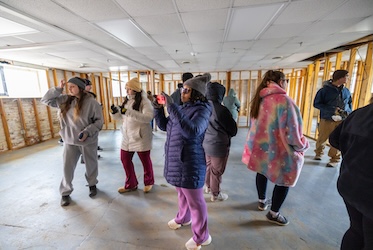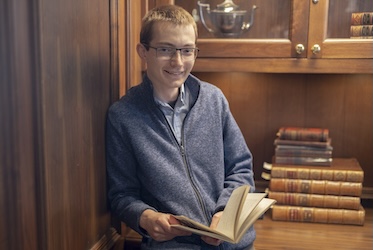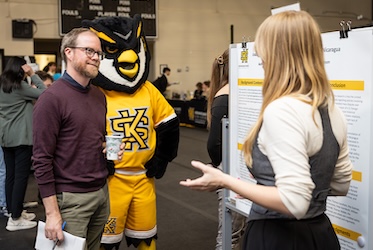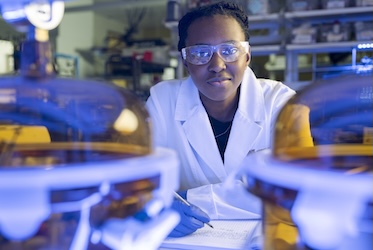
Star student overcomes homelessness to excel
KENNESAW, Ga. | Nov 5, 2020

To say Kennesaw State senior Carrie Lyn Barron has a lot of irons in the fire is an understatement.
Among those who know her, the most popular observation is “I don’t know how she does it.”
Barron, a non-traditional cellular, molecular and developmental biology major and student in KSU Journey Honors College, works in the lab of professor of biochemistry Jonathan McMurry, works two jobs and cares for her husband, Jay, who has autosomal dominant polycystic kidney disease (ADPKD). She donated a kidney to him in 2014. Complications and expenses from the disease and resulting treatments cost the couple their house, and they lived in their car for a year and a half. With support from Kennesaw State’s Campus Awareness, Resource and Empowerment (CARE) Services, the couple now have a stable place to live.
Barron, scheduled to graduate on time in the spring, has her eye on completing a doctorate in molecular biology.
Barron’s answer to those observations is simple: “I can’t not do this.”
———
Carrie Lyn grew up in Burley, Idaho, a small town where she said girls were not encouraged to pursue higher education. The constraints of the place eventually got to her. So when Jay visited family in Idaho, he talked then-19-year-old Carrie Lyn into a date and proposed soon afterward. They married three months later—on the condition that they leave Burley. Shortly thereafter, the two moved to the Southeast, nearer his father and stepmother.
Eventually, Jay showed symptoms of ADPKD, a genetic disorder in which cysts form in the kidneys. Carrie Lyn said the disease ran through his family, so it was only a matter of time before it manifested in Jay. He eventually needed a kidney transplant, which happens in about half of ADPKD patients. In January 2014, Carrie Lyn donated a kidney for the transplant.
Renowned transplant doctor Christian Larsen of Emory University, who handled Jay’s father’s transplant, also operated on Jay. Carrie Lyn impressed Larsen with her curiosity, and he suggested she go to college.
All the while, Carrie Lyn hit the books and the internet, devouring any information she could find on ADPKD. She consulted YouTube channels, encyclopedias and scholarly journals. The doctors treating Jay were impressed enough with her diligence to insist she go to college, so she did, for the first time at age 37. But she had to drop out to work and care for Jay, though her love of learning never abated.
“I pushed the desire to learn aside, but it sparked up again when Jay got sick and I started doing all that research,” she said. “I remembered how good it felt to learn things and then to have conversations with doctors and researchers, how it felt to be valued.”
Jay’s younger half-brother Daniel spoke highly of KSU, where he earned his degree and where Carrie Lyn enrolled for the fall semester in 2017, taking a full course load as she has done each semester since—including summers.
The ongoing medical issues left the Barrons devastated financially, and they lived in their car. When she confided in a professor that she was unsure of her housing situation, they recommended she approach CARE, where she met director and founder Marcy Stidum.
“She was always forthcoming about her academic and personal goals, humble regarding her academic capabilities, but we had to pull it out of her how badly she needed our help,” Stidum said. “Carrie Lyn insisted she was OK, and was always thankful for the pantry resources. She felt like someone was worse off than her, so it took a while for her to allow us to help find the right resources to meet all of her needs.”
Carrie Lyn said she had resolved in her mind to just get through her undergraduate years homeless before earning a spot in a Ph.D. program, which would carry a stipend that could pay for housing. Last summer, a CARE donor who owns an apartment complex offered to move the Barrons into an apartment for the 2019-20 school year, and then renewed the lease for the current school year, allowing the Barrons to save money before she moves on to graduate school.
Fully engaged with her studies, Carrie Lyn joined the research team in McMurry’s lab in March 2019 and immediately rose to the top.
“Carrie Lyn has by far the most specific research interest I've ever seen in an undergraduate, for obvious reasons,” McMurry said. “She has jumped into research with both feet and not looked back. The skills she's learning—protein purification, tissue culture, confocal microscopy—will transfer to her chosen field, and she understands that, which probably explains why she has so much passion for what we're doing.”
Stidum said Carrie Lyn has become an ambassador for CARE.
“She's grown in her self-confidence,” Stidum said. “She sets the bar high and knows she can achieve her dreams and understands that she has a lot of people in her corner. But also, she has grown in her willingness to share her ‘CARE Story’ to help other KSU students like her get help from CARE, too.”
In the classroom and in the lab, Carrie Lyn has continued to excel. She will complete a Capstone project on cell-penetrating peptides this fall. She was set to present at the National Council for Undergraduate Research in spring 2020, and had lined up a summer internship at Cambridge University in England to study with renowned microbiologist Jillian Frazier, but COVID-19 scuttled those plans.
As for Jay, Carrie Lynn said that her husband is doing as well as he can. He has good days and bad days, draining off a pint of excess blood every six weeks, taking various medications and meeting regularly with physicians.
Nothing will keep Carrie Lyn from earning her doctorate and bringing the world closer to a cure for ADPKD. Her team of mentors collectively is confident she’ll achieve her goal, and so is she.
“I’m very excited to go to grad school. That was something I wanted from the start,” she said. “I didn’t know how I would get there, but I knew I would. After that first taste of education I knew I wanted to get my Ph.D. and that I’d figure it out along the way. Now it’s real.
“You know how deep down in your bones you know you’re in the right place in the right moment doing the right things? That’s what it feels like when I’m in the lab. I’m doing what I’m meant to do. And I want that feeling to last.”
– David Shelles
Photos by Jason Getz
Related Stories

Kennesaw State architecture, engineering students reimagine Asheville's devastated River Arts District

First-year Kennesaw State student, author recognized as versed local historian

Kennesaw State students to present research at Symposium of Student Scholars

Chemistry student engaged in sustainable catalyst research through Kennesaw State's First-Year Scholars program
A leader in innovative teaching and learning, Kennesaw State University offers undergraduate, graduate, and doctoral degrees to its more than 47,000 students. Kennesaw State is a member of the University System of Georgia with 11 academic colleges. The university’s vibrant campus culture, diverse population, strong global ties, and entrepreneurial spirit draw students from throughout the country and the world. Kennesaw State is a Carnegie-designated doctoral research institution (R2), placing it among an elite group of only 8 percent of U.S. colleges and universities with an R1 or R2 status. For more information, visit kennesaw.edu.















